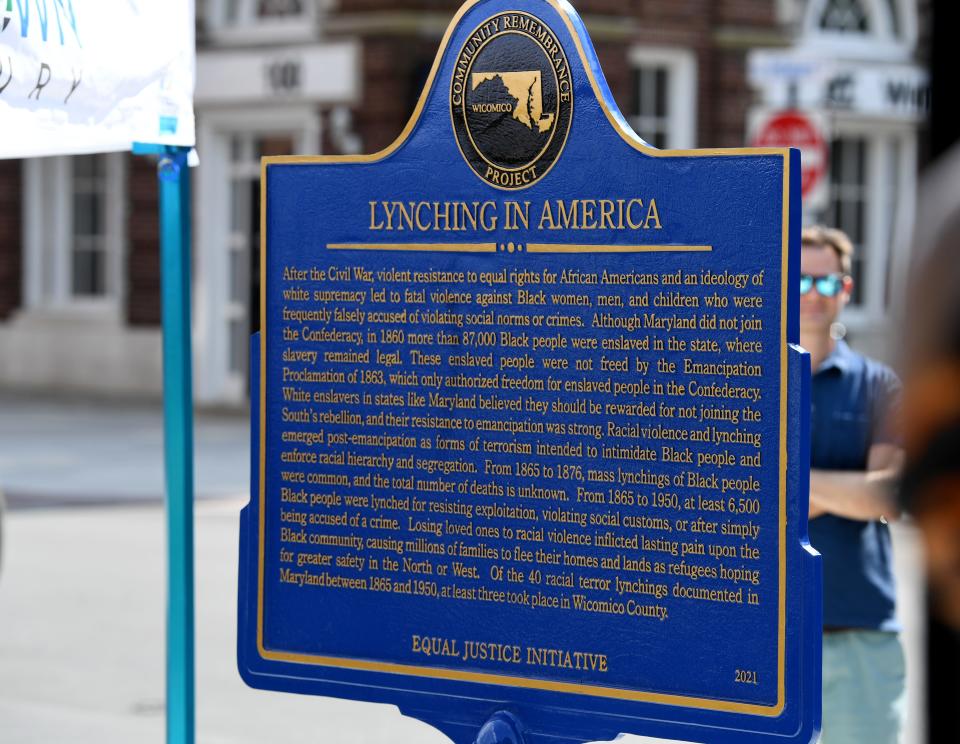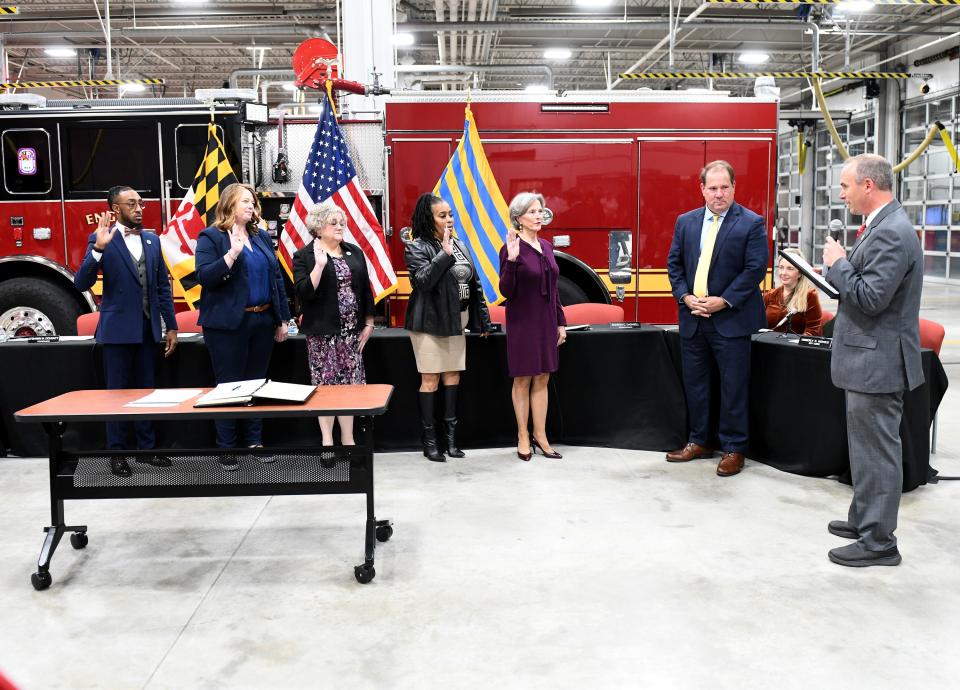Will Salisbury issue apology for lynchings? Here are latest updates from City Council
- Oops!Something went wrong.Please try again later.
The racial violence that plagued Salisbury's past was the topic of a special City Council work session Monday that could lead to a formal apology for the lynching deaths of three black men.
The resolution written by the Wicomico NAACP Branch 7028b and the Wicomico Truth and Reconciliation Initiative seeks to address the city’s historical role in lynching deaths from 1898 to 1931, with the draft currently under review by the city's legal counsel.
Among the victims were Garfield King, Matthew Williams and an unidentified middle-aged male. The county's NAACP chapter also contends some city officials during that time have recently been identified as having been directly involved in the lynching of Williams on Dec. 4, 1931. Specifically, the organization had confirmed then-Police Chief Nicholas Holland helped lead the mob that kidnapped Williams, and Fire Chief Frederick Grier, Jr. found rope for Williams' lynching.
More on the NAACP forum Lessons from Salisbury's history of racial turmoil prompt frank discussion at forum
"This painful chapter in our city's history demands our attention as it symbolizes the darkest aspects of our past," said LaTanya Christopher, descendant of Garfield King, at Monday's council meeting. "Garfield King was a victim of a heinous crime born out of racial hatred and injustice. He was subjected to an unimaginable act of brutality and his life was taken from him not by an act of justice, but by the forces of bigotry and prejudice."
Christopher noted she was not seeking vengeance, but recognition through a formal apology to "not dwell on the past," but to learn and heal from it as a community.
Along with the apology, Christopher echoed the sentiments of both the NAACP chapter and initiative that educational programs could be offered to discuss that era of racial violence to ensure it is not repeated. It would also serve as means of remembering those impacted by such violence.
Stops and starts on apology 'just brings more pain'

President of the Wicomico County NAACP Monica Brooks called the resolution a long-overdue opportunity at reconciliation.
"This (resolution) will bring this matter to a place where we are all truly here for one another. The difficulty in this process was that the (apology) was approved, then not approved and then put on pause. Each time this happens, it just brings more pain to families that need that closure and have had this just drag out," Brooks said at Monday's meeting.
James Yamakawa, a board member of the Truth and Reconciliation Initiative, also noted racial violence like lynching nationwide took over a century to be deemed a hate crime. Locally, he added the resolution was also a slow process in order to have it ready for the City Council.
"This (resolution) was a result of several months of petitioning the former mayor of Salisbury. Twice we were refused. The resolution itself is a jumping off point and isn't perfect and the language we created is there along with changes by the city's legal counsel. Some revisions were from a legal, and not necessarily a moral perspective," Yamakawa said Monday.
Salisbury City Council President D'Shawn Doughty noted hearing from community on a possible resolution was an important step in coming to terms with city's history.
"It's important to acknowledge as a city where we have had shortcoming, but also to recognize the path forward includes being accountable to ourselves to have right building blocks to do so," Doughty said.
More on origins of the ordinance 'Origin of hate': NAACP seeks formal apology from city of Salisbury for lynching history
What's in the apology resolution being considered by the council?

The newly elected members of the City Council are considering the resolution that outlines the events surrounding the deaths of these men and those found to be responsible through historical research.
"The term 'racial terror lynching,' according to the Equal Justice Initiative, means the intentional inflicting of lethal violence at people because of their race, as an effort to terrorize the entire community and reinforce an existing racial hierarchy," the resolution begins.
It further asserts on May 31, 1898, a white mob numbering over a hundred broke into the county jail in Salisbury and kidnapped an 18-year-old black male, Garfield King, who was accused of murdering a white man. He was taken to the Wicomico County courthouse lawn, hung from a tree, and reportedly his body was shot 50 times.
No one was ever officially identified as being a part of the mob.
During another incident on Dec. 4, 1931, a white mob numbering several hundred to upwards of a thousand individuals kidnapped a 23-year-old Black male named Matthew Williams from the negro ward at Peninsula General Hospital. Williams was accused of the murder of his employer, a white man named Daniel Elliot.
More on historic free black communities Free Black people built an Eastern Shore village. Why descendants want you to know it's here
After being tortured and hung on the Wicomico County courthouse lawn, his body was dragged through the nearby Black neighborhood and then set on fire in a vacant lot.
Finally, following the racial terror lynching of Matthew Williams, an unknown middle-aged black male was found beaten to death, presumably by either members of the same white mob.
"Be it resolved by the City Council of Salisbury that it formally apologizes to the known descendants of the victims, Ms. LaTanya Christopher, descendant of Garfield King, and Ms. Jeannie Jones, descendant of Matthew Williams, and to the Black community at large for the city’s role in these acts of racial terrorism, and for the intervening years of silence," the resolution states.
The city council has now placed the resolution concerning forgiveness for the racial terror lynching of three black citizens on the Monday, Dec. 11, regular legislative session agenda.
This article originally appeared on Salisbury Daily Times: Lynchings apology drive advances with council resolution. What it says

